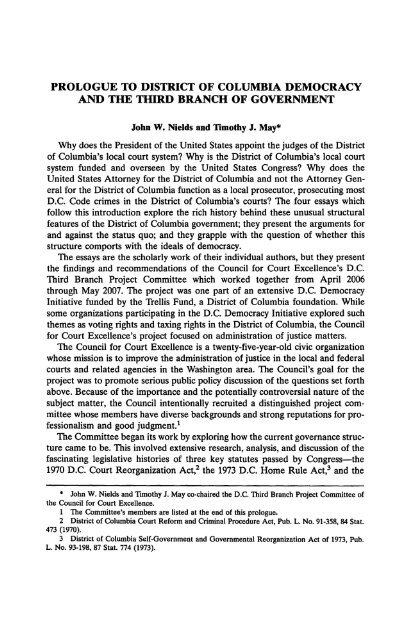Download Electronic Version - UDC Law Review
Download Electronic Version - UDC Law Review
Download Electronic Version - UDC Law Review
You also want an ePaper? Increase the reach of your titles
YUMPU automatically turns print PDFs into web optimized ePapers that Google loves.
PROLOGUE TO DISTRICT OF COLUMBIA DEMOCRACY<br />
AND THE THIRD BRANCH OF GOVERNMENT<br />
John W. Nields and TImothy J. May*<br />
Why does the President of the United States appoint the judges of the District<br />
of Columbia's local court system? Why is the District of Columbia's local court<br />
system funded and overseen by the United States Congress? Why does the<br />
United States Attorney for the District of Columbia and not the Attorney General<br />
for the District of Columbia function as a local prosecutor, prosecuting most<br />
D.C. Code crimes in the District of Columbia's courts? The four essays which<br />
follow this introduction explore the rich history behind these unusual structural<br />
features of the District of Columbia government; they present the arguments for<br />
and against the status quo; and they grapple with the question of whether this<br />
structure comports with the ideals of democracy.<br />
The essays are the scholarly work of their individual authors, but they present<br />
the findings and recommendations of the Council for Court Excellence's D.C.<br />
Third Branch Project Committee which worked together from April 2006<br />
through May 2007. The project was one part of an extensive D.C. Democracy<br />
Initiative funded by the Trellis Fund, a District of Columbia foundation. While<br />
some organizations participating in the D.C. Democracy Initiative explored such<br />
themes as voting rights and taxing rights in the District of Columbia, the Council<br />
for Court Excellence's project focused on administration of justice matters.<br />
The Council for Court Excellence is a twenty-five-year-old civic organization<br />
whose mission is to improve the administration of justice in the local and federal<br />
courts and related agencies in the Washington area. The Council's goal for the<br />
project was to promote serious public policy discussion of the questions set forth<br />
above. Because of the importance and the potentially controversial nature of the<br />
subject matter, the Council intentionally recruited a distinguished project committee<br />
whose members have diverse backgrounds and strong reputations for professionalism<br />
and good judgment. 1<br />
The Committee began its work by exploring how the current governance structure<br />
came to be. This involved extensive research, analysis, and discussion of the<br />
fascinating legislative histories of three key statutes passed by Congress-the<br />
1970 D.C. Court Reorganization Act? the 1973 D.C. Home Rule Act? and the<br />
* John W. Nields and TImothy J. May co-chaired the D.C. Third Branch Project Committee of<br />
the Council for Court Excellence.<br />
1 The Committee's members are listed at the end of this prologue,<br />
2 District of Columbia Court Reform and Criminal Procedure Act, Pub. L. No. 91-358, 84 Stat.<br />
473 (1970).<br />
3 District of Columbia Self-Government and Governmental Reorganization Act of 1973, Pub.<br />
L. No. 93-198,87 Stat. 774 (1973).














